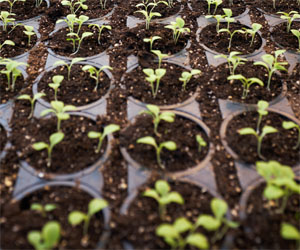


A Smarter Way To Control Your Comfort

The evolution of home technology has given rise to a wide array of smart devices, all designed to make our lives more efficient and convenient. One standout example of this technological innovation is the intelligent thermostat. These devices have transformed the way we control and manage the temperature in our homes. In this article, we'll explore how intelligent thermostats work, their benefits, and why they are becoming an essential addition to modern homes.
How Intelligent Thermostats Work
Intelligent thermostats are a significant departure from traditional thermostats. They leverage advanced technology, including sensors, Wi-Fi connectivity, and machine learning algorithms, to provide precise and customizable control over your home's heating and cooling systems. These thermostats gather data about your preferences, daily routines, and the current conditions inside and outside your home. With this information, they can automatically adjust the temperature to create a comfortable and energy-efficient environment.
Benefits Of Intelligent Thermostats
Energy Efficiency: One of the primary benefits of intelligent thermostats is their ability to save energy and reduce utility costs. By learning your temperature preferences and adapting to your schedule, these devices can optimize heating and cooling, preventing unnecessary energy consumption.
Customized Comfort: Intelligent thermostats allow you to set personalized schedules and temperature preferences for different times of the day and week. You can ensure that your home is warm in the morning and cooler at night, all without manual adjustments.
Remote Control: Most intelligent thermostats are Wi-Fi enabled, giving you the power to control your home's temperature remotely through smartphone apps or web interfaces. This feature is especially useful when you're away from home and want to ensure it's comfortable upon your return.
Learning Capabilities: Over time, intelligent thermostats adapt to your lifestyle. They learn when you're typically at home and when you're not, making automatic adjustments to save energy without sacrificing your comfort.
Compatibility: These thermostats are often compatible with various heating and cooling systems, including traditional furnaces and air conditioners, heat pumps, and radiant floor systems.
Voice Control: Many intelligent thermostats are compatible with voice-activated virtual assistants like Amazon's Alexa or Google Assistant, allowing you to adjust the temperature with simple voice commands.
Data Insights: Intelligent thermostats provide data and insights about your energy usage, helping you make informed decisions to further reduce your energy consumption.
Popular Intelligent Thermostat Brands
Several companies have pioneered the development of intelligent thermostats, with some of the most well-known brands including:
Nest: The Nest Learning Thermostat is a standout in the intelligent thermostat market. It learns your schedule and adapts to your preferences over time.
Ecobee: Ecobee thermostats come with remote sensors that allow for more accurate temperature control and room-by-room monitoring.
Honeywell: Honeywell offers a range of intelligent thermostats, including models with customizable touchscreen interfaces and voice control.
Tado: Tado thermostats focus on improving energy efficiency and are known for their geo-fencing capabilities, which can automatically adjust settings based on your proximity to home.
Intelligent thermostats are revolutionizing the way we manage home comfort. Their ability to save energy, provide personalized comfort, and offer remote control has made them a sought-after addition to modern households. With ongoing advancements in technology, these devices are likely to become even more efficient and integrated into the broader smart home ecosystem, further enhancing our quality of life and environmental sustainability.
Embracing Simplicity And Freedom
 2. Minimalist Living
2. Minimalist Living
The compact lifestyle often goes hand in hand with minimalist living. Minimalism is the art of living with less, focusing on quality over quantity, and savoring life's experiences over material possessions. This approach allows individuals to focus on what truly matters and brings joy, while reducing the overwhelming feeling of too much stuff.
3. Environmental Consciousness
Embracing a compact lifestyle also leads to a greater sense of environmental consciousness. Smaller living spaces mean reduced energy consumption, less waste, and a lower carbon footprint. This lifestyle choice can significantly contribute to a more sustainable and eco-friendly way of living.
4. Financial Freedom
Living a compact lifestyle can lead to significant financial benefits. With fewer expenses related to housing, maintenance, and possessions, individuals have the opportunity to save more, invest wisely, and gain financial freedom. This financial independence can open doors to new opportunities and experiences.
The Heart Of Gardening Success
 4. Pest And Disease Management: Keep an eye out for common pests and diseases in your garden. Early detection and appropriate action are essential for preventing infestations. Consider using natural pest control methods to minimize the use of chemicals, which can harm beneficial insects and pollinators.
4. Pest And Disease Management: Keep an eye out for common pests and diseases in your garden. Early detection and appropriate action are essential for preventing infestations. Consider using natural pest control methods to minimize the use of chemicals, which can harm beneficial insects and pollinators.
5. Fertilizing: Plants need nutrients to thrive, and fertilizing can provide a boost when your garden soil is lacking. Select a balanced, slow-release fertilizer and follow the recommended application rates. Over-fertilization can be harmful, so always adhere to the instructions on the product.
6. Mulching: Mulching is a beneficial practice that conserves moisture, suppresses weeds, and regulates soil temperature.






The Fruits Of Gardener's Labor
 Connection To Nature
Connection To Nature
Gardening is a harmonious dance with nature. Abundant harvests illustrate the beautiful partnership between the gardener and the Earth. Tending to the soil, choosing the right seeds or saplings, watering, and protecting your plants from pests and disease — all these efforts are rewarded by the Earth's generous bounty. The cycles of life in your garden, from planting to harvesting, mirror the larger cycles of nature, and they remind us of our place in the natural world.
Self-Sufficiency And Sustainability
Abundant harvests also represent a move toward self-sufficiency and sustainability. Growing your own food not only reduces your reliance on commercial agriculture but also ensures that you have a fresh and healthy food source right at your doorstep. It empowers individuals and families to take control of their food supply and make environmentally conscious choices. When you produce your food, you reduce the carbon footprint associated with transportation and packaging.
Health And Nutrition
The fruits of abundant harvests are some of the healthiest foods you can consume. Homegrown produce is free from harmful chemicals and pesticides, offering unparalleled freshness and nutrition. These vegetables and fruits are picked at their peak ripeness, preserving their vitamins, minerals, and flavors. When you have an abundant harvest, you have an abundance of wholesome, nutrient-rich foods at your disposal.
Sharing The Bounty
Abundant harvests often lead to an abundance that extends beyond your own household. Gardeners frequently find themselves with more produce than they can personally consume. This surplus can be shared with friends, family, and the community. Sharing the fruits of your labor is a deeply satisfying experience that strengthens bonds and fosters a sense of community.
The Dynamics Of Growth And Development
 Physical Growth
Physical Growth
Physical growth is most evident during infancy and adolescence. During infancy, babies experience rapid physical growth, leading to significant weight gain and a noticeable increase in length. In adolescence, a growth spurt occurs, contributing to the dramatic changes in height and the development of secondary sexual characteristics.
Cognitive Development
Cognitive development is the process of acquiring knowledge, reasoning abilities, problem-solving skills, and language proficiency. Jean Piaget's theory of cognitive development identifies stages of development, from the sensorimotor stage in infancy to the formal operational stage in adolescence. This progression reflects the increasing complexity of thought processes and problem-solving abilities.
Emotional And Social Development
Emotional and social development is equally critical. Erik Erikson's psychosocial stages of development outline the challenges individuals face at different life stages. Emotional intelligence, the ability to recognize, understand, and manage one's own emotions, plays a vital role in social development, enabling individuals to form healthy relationships and navigate complex social situations.
Factors Influencing Growth And Development
Numerous factors influence the trajectory of growth and development, including genetics, nutrition, environmental factors, and socio-economic conditions. Genetic factors establish the baseline for an individual's growth potential, while nutrition plays a pivotal role in physical and cognitive development. Malnutrition during critical periods can lead to stunted growth and cognitive impairments.
Environmental factors, such as exposure to toxins and pollutants, can have detrimental effects on both physical and cognitive development. In contrast, enriching environments with access to education, healthcare, and social support systems foster positive growth and development.
Nurturing A Sustainable Tomorrow
 Sustainable Transportation: Opting for eco-friendly modes of transportation, such as biking, carpooling, or using public transit, can help reduce air pollution and the carbon footprint associated with personal travel.
Sustainable Transportation: Opting for eco-friendly modes of transportation, such as biking, carpooling, or using public transit, can help reduce air pollution and the carbon footprint associated with personal travel.
Mindful Consumption: Eco-conscious individuals make deliberate choices when it comes to the products they buy. They prioritize environmentally friendly and sustainably sourced goods, supporting companies that adhere to eco-conscious principles.
Conservation Of Water: Water is a finite resource, and eco-conscious living encourages water conservation through efficient fixtures, rainwater harvesting, and responsible water use practices.
Local And Organic Foods: Supporting local and organic food production not only reduces the carbon footprint associated with food transportation but also promotes healthier eating and sustainable agriculture.
Eco-Friendly Energy: Harnessing renewable energy sources, such as solar panels and wind turbines, is a significant aspect of eco-conscious living. It reduces reliance on fossil fuels and lowers energy costs.
A Sustainable Solution For Water Scarcity
 The Importance Of Rainwater Conservation
The Importance Of Rainwater Conservation
Water scarcity is a pressing global concern that affects millions of people, ecosystems, and industries. Many regions of the world are already experiencing the detrimental effects of water shortages, which can lead to droughts, crop failures, and even conflicts over dwindling water resources. Rainwater conservation addresses this issue by harnessing a natural resource that often goes underutilized.
The Collection Process
Rainwater conservation typically begins with the collection of rainwater from rooftops, pavements, or other surfaces. This water, known as runoff, is channeled through gutters and downspouts into storage tanks or cisterns. The collected rainwater can then be filtered and treated to make it suitable for various non-potable uses, such as watering gardens, flushing toilets, and washing vehicles. In some cases, rainwater can even be purified for drinking, further reducing the demand on municipal water supplies.
Environmental Benefits
One of the primary advantages of rainwater conservation is its positive impact on the environment. By capturing rainwater, we reduce the burden on natural water sources, such as rivers and lakes. This, in turn, helps protect aquatic ecosystems and maintains their biodiversity. Moreover, rainwater harvesting reduces soil erosion and minimizes the risk of flooding, as it diverts rainwater away from stormwater drainage systems.
Economic Benefits
Rainwater conservation also provides significant economic benefits. By using rainwater for non-potable purposes, homeowners and businesses can reduce their water bills, resulting in cost savings.